Dentures Lakewood
Restore Your Smile and Biting Force
More than 100 million Americans are missing teeth, and of that, about 40 million are missing all of them. If you’re part of that statistic, eating, speaking, and even smiling can become near impossibilities without exposing the gaps in your grin. Luckily, there’s a solution – dentures in Lakewood can restore your smile and biting force to as much as 70% of what they once were. These prostheses allow you to chew, talk, and smile with complete confidence once more. If you’re sick of suffering through missing teeth, schedule a consultation with us to see if dentures are the right way to solve your problem.
Why Choose Lakewood Complete Dentistry for Dentures?
- Custom-Made Dentures for Each Patient
- Dentures Restore Your Biting Force Up to 70%
- Allows You to Smile with Complete Confidence Again
What Are the Types of Dentures?
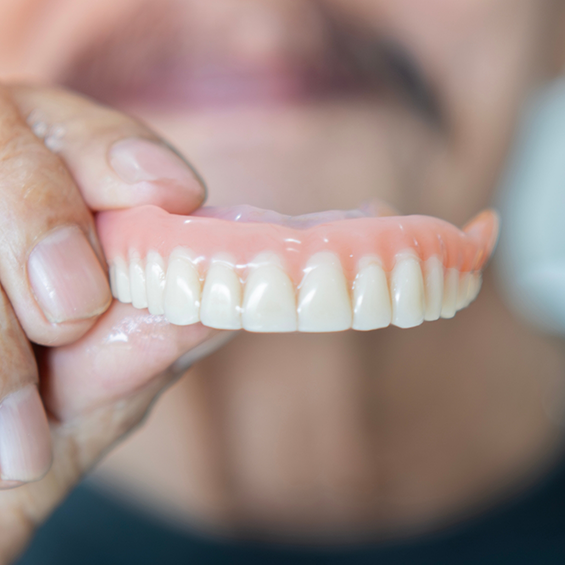
There are two types of dentures: full and partial. The former consists of a set of artificial teeth attached to an acrylic base that matches your gum tissue. It is secured to your gumline with natural suction and denture adhesive if necessary. If you’re missing all of your teeth on a single arch, then your dentist in Lakewood will suggest getting a full denture.
Partial dentures, also called partials, are ideal for patients who are only missing a few teeth on either arch. These are connected to a metal framework that attaches to your remaining teeth with clasps. Partials are designed to blend in with the rest of your smile, creating a beautiful set of pearly whites.
Who’s a Good Candidate for Dentures?
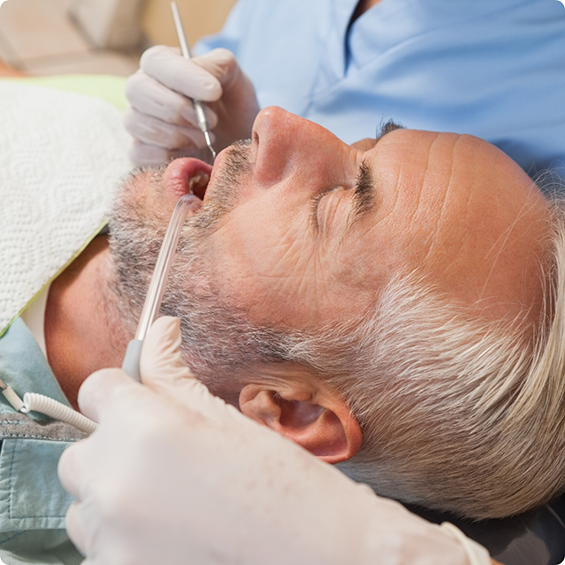
Dentures are one of the most versatile tooth replacement options around, and here at Lakewood Complete Dentistry, we can easily look at your mouth and determine how dentures can save your smile! Whether you’re missing one, two, several, or all of your pearly whites, you’ll be happy to hear that nearly everyone is potentially a good candidate for dentures. Even if you’re not eligible at first, we can help restore the health of your smile to the point where dentures become a viable solution.
Effects of Missing Teeth
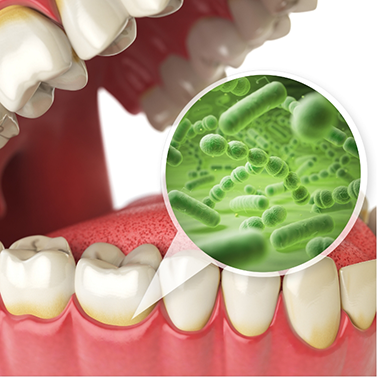
According to the American College of Prosthodontists, some of the most common causes of missing teeth are simply the result of poor oral hygiene that’s led to gum disease, dental decay, and other problems that can progress rapidly. All of these issues are problematic on their own, but when they lead to missing teeth, your oral health is in considerable danger.
Perhaps the biggest issue concerning missing teeth is the likelihood for additional ones to fall out as they lean toward the gaps in your smile; this domino effect is hard to stop once it’s begun, and restoring lost teeth is the only way to counter it.
Another huge issue is the effect it has on your jawbone; your jaw can begin to deteriorate due to lack of stimulation. This will cause the bone tissue to weaken, further increasing the risk of tooth loss. Plus, without a root to promote a strong jawbone, you might also experience complications like facial sagging, difficulty eating, and dampened self-esteem.
What Qualifies You for Dentures?
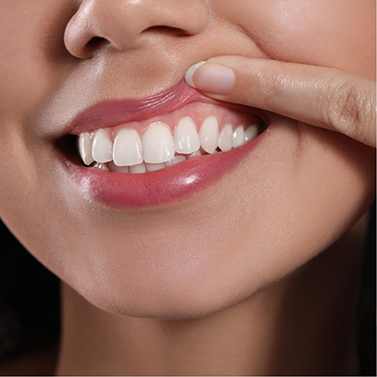
The majority of patients who suffer from extensive tooth loss are good candidates for dentures, so barring a few exceptions, you’re likely eligible for the tried-and-true prosthetics! As long as you’re in good general oral health and have healthy gums and enough jawbone density, we can determine which type of denture (partial or full) is best suited for your needs during your initial consultation. Those patients who receive dentures must commit to their dental health moving forward, but the results are well worth the diligence.
Alternative Tooth Replacement Options
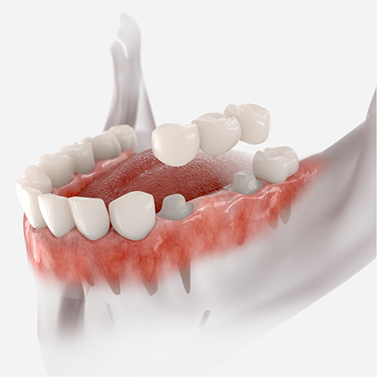
Thanks to all the advancements in dental technology, various alternatives to dentures can replace lost teeth all the same. Here are just a few of the other options we offer:
- Dental bridges – These are often best for those who are only missing one or just a few teeth. However, the bridge requires healthy adjacent teeth surrounding the gap to remain supported.
- Dental implants – These restorations consist of titanium posts that are directly embedded into the jawbone for outstanding support. That said, they require sufficient bone density and optimal oral health to function but can last for virtually a lifetime.
Learn More About Dental Bridges
Learn More About Dental Implants
The Benefits of Dentures
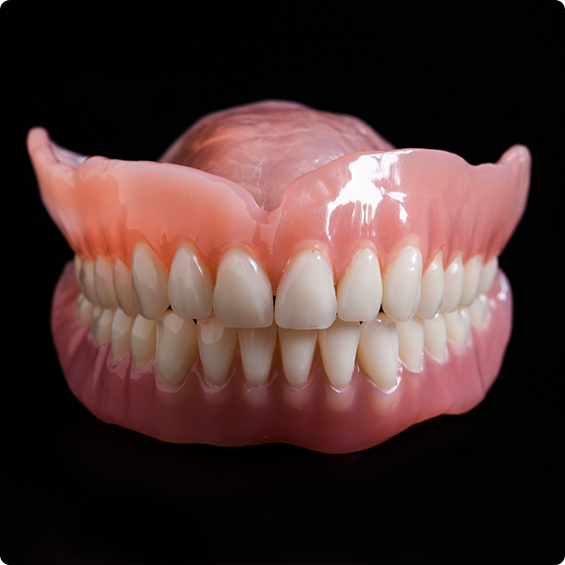
Living without all your teeth is a challenge. Typically, the situation gets in the way of daily tasks – eating, speaking, smiling, etc. Dentures, however, can easily fix your tooth loss. The result would be a slew of perks that improve your quality of life! As for what these upsides are, our dental team will happily explain. Just keep reading to learn the benefits of dentures in Lakewood. Otherwise, feel free to call our office for details.
Psychological Benefits

As you might know, tooth loss can be hard to accept. Being without a full smile, after all, is unnerving. Therefore, it often decreases your self-esteem and body image. These changes, in turn, can prompt you to retreat from social settings and develop sadness or depression.
Dentures, though, solve this particular issue. By restoring your full smile, they’ll boost your self-confidence and lower your anxiety. Consequently, you’ll feel at ease about your looks, speech, eating ability, and more.
Clearer Enunciation

When lacking teeth, it isn’t easy to speak. Pearly whites, you see, help position your lips and tongue for speech. Missing even a few will make some words hard to pronounce.
Thankfully, dentures can (and do) act as substitute teeth. They’ll support your tongue and lips for speech. You will, however, need to get used to them first. It takes practice to speak with these new teeth naturally.
Improves Nutrition

Meals are tricky without a full set of teeth. That’s only natural – you need chompers to chew meals. As such, you may end up restricting your diet. Healthy foods with tough textures, especially, might be excluded for being too tough. Unfortunately, that kind of change will cause malnutrition or indigestion.
Of course, dentures would prevent these outcomes. Artificial teeth chew food almost as well as natural ones. In other words, the restorations widen your dietary options and ensure proper nutrition.
Preserves Oral Health

Tooth loss hinders more than your physical appearance; it also harms your oral health. Its smile gaps, for starters, serve as breeding spots for harmful bacteria. Even worse, these spaces also pull on your surrounding teeth. Left unchecked, this will tilt the pearly whites until they fall out.
Still, dentures will protect oral health by “filling in” the gaps. They prevent nasty germs from growing freely. At the same time, they’ll stop your other chompers from tilting.
Expands Opportunities

For better or worse, you need a pretty smile for good first impressions. People notice your grin before any of your other features. As a result, gleaming teeth strengthen your connections – with friends, family, co-workers, and others.
Dentures, fortunately, give you such teeth. They use acrylic to look lifelike and blend seamlessly. Receiving treatment, then, will expand your opportunities with various peers. It might even help you land a promotion or raise at work! Should that happen, your dentures could practically pay for themselves!
What If I Want Dentures That Don’t Slip Around?
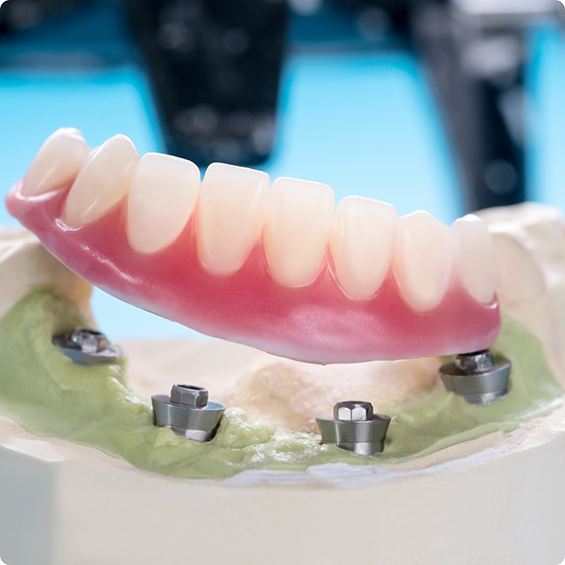
Even the most well-fitted dentures eventually start to slip while you talk and eat after a few years. To prevent this, we can place several dental implants in your jaw to secure your denture.
An average of four to six of these biocompatible titanium posts are inserted at an angle into your jawbone to replace the roots of your missing teeth. The implants will provide unparalleled stability so that your dentures will be firmly anchored in place. Your dentures can be either fixed or removable, depending on your personal preference. Additionally, dental implants can last up to three decades or even longer with proper maintenance. You can enjoy your prosthesis for the rest of your life if you take good care of it!
How Dentures Are Made
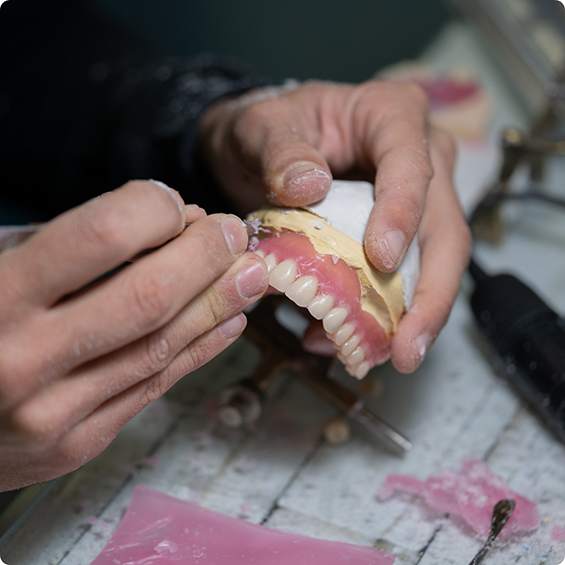
If you decide to get dentures in Lakewood, you may wonder how they’re made. After all, it’s only fair that you know what goes into your new teeth. That said, perhaps you aren’t sure where to find the relevant details. Well, look no further: the team at Lakewood Complete Dentistry has you covered. Below, you’ll find a summary of typical denture components and the process used to make them. Read it over to gain a new appreciation for dental restorations.
What Are Dentures Made Of?
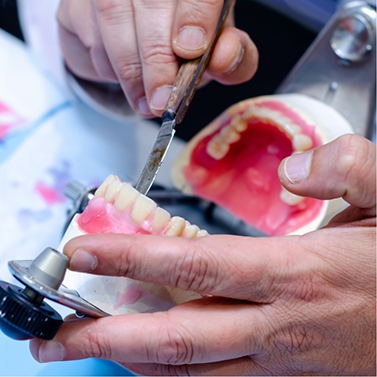
Typically, dentures are made up of two parts: the base and the artificial teeth. Consider, then, the following details:
- Denture Base – A denture’s base is the gum-colored part resting on your mouth’s tissues. Its main function is holding artificial teeth that replace your missing ones. A dental lab normally makes one from varying materials (acrylic, porcelain, etc.) but will choose the substance based on the type of denture needed.
- Artificial Teeth – Artificial teeth are the tooth-replacing portions of a denture. As such, they’re made from resin or porcelain to ensure a natural look. Still, porcelain can be abrasive on adjacent teeth and is thus suggested only for full dentures.
The Denture Creation Process

Generally, a dentist will customize a denture for the patient’s mouth. The result is that a multi-step process uniquely shapes any given one. Here’s a brief rundown of what those steps look like:
- Step 1: The dentist takes an impression of your upper and lower gums. From there, the resulting model is sent to a lab to help create the dentures.
- Step 2: Once crafted, the lab sends the wax dentures to the dentist/prosthodontist for a fitting. Assuming patient and dentist approval, the restorations are returned to the lab for completion.
- Step 3: A technician boils the dentures to remove their wax portions. They then place the appliance in a flask to pour plaster. Subsequently, the flask is placed in hot water to melt the dentures.
- Step 4: The lab worker makes holes in the artificial teeth so new material can attach. A liquid separator is also added to the plaster layer to prevent the acrylic from sticking. The same acrylic is then injected into the flask to replace the wax.
- Step 5: The worker removes the plaster to reveal the prosthetics. Later, they place the dentures in an ultrasonic bath to remove leftover plaster.
- Step 6: After cutting away excess acrylic, the technician polishes the restorations.
- Step 7: You return to the office for fitting and final adjustments.
Adjusting to Your New Dentures
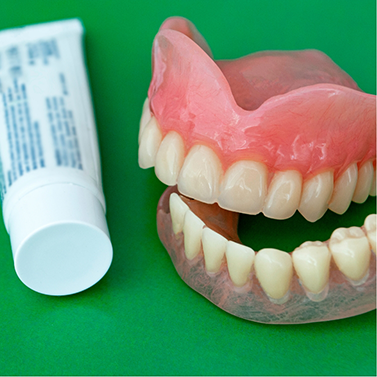
It’s normal to have minor discomfort when you first wear dentures. In fact, the odds are that you’ll feel sore and face difficulty speaking and eating. However, rest assured that these are temporary. Any lingering pain will fade as you adjust. With time, the dentures will soon feel similar to natural teeth.
If you’d like, though, you can try to speed up the adjustment. Tips include:
- Eat soft foods
- Practice facial exercises
- Experiment with adhesives
Should your discomfort persist, contact our office immediately. There’s a chance your dentures need readjustment.
Understanding the Cost of Dentures
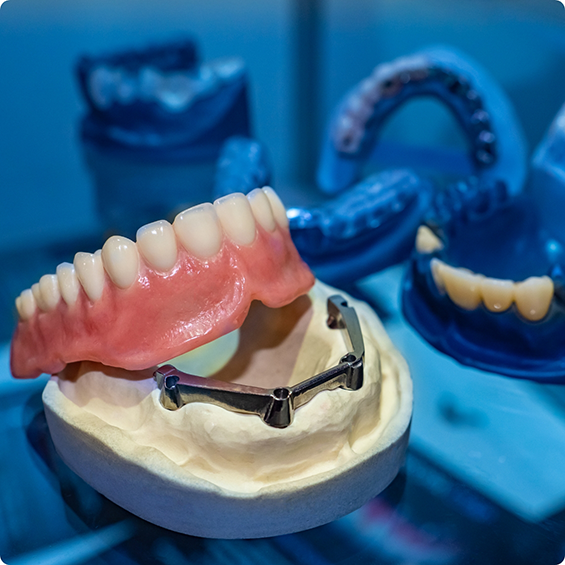
The cost of many different dental procedures can differ from case to case, and dentures are no exception. Our dentist will spend part of your initial consultation explaining the different factors that can end up affecting the final cost, and we will answer any questions you might have regarding the price. We hope that you walk away from our office with a clear idea of what you can expect when the time comes to pay for your new teeth.
Factors That Affect the Cost of Dentures
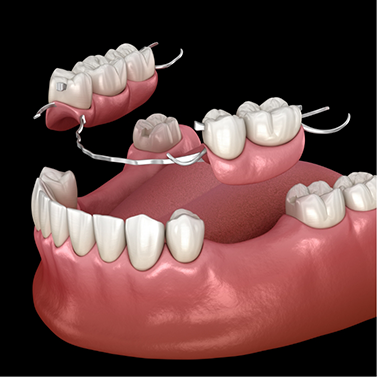
Some of the most influential factors that will impact the amount you pay for dentures include:
- The need for tooth extractions, gum disease therapy, and other forms of preparatory work
- The number of teeth that are missing (or are expected to be removed in the near future)
- The kind of material the denture is made of, such as porcelain or acrylic
These are just a few examples; our team can go over additional factors with you. Do bear in mind that cheaper does not automatically equal better for dentures. When false teeth are made out of less expensive materials, they’re generally more likely to break and will probably need to be replaced much sooner. It’s better to invest in a quality denture now than to repeatedly pay for inexpensive dentures that won’t last as long.
Are Implant Dentures More Expensive?
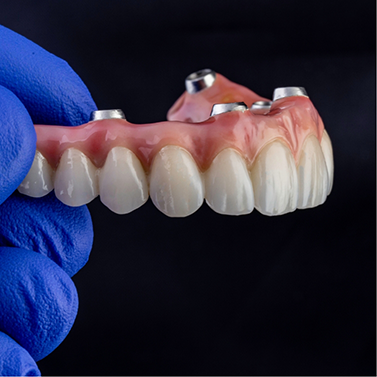
Dental implants and the surgery required to place them in the mouth come with their own costs. As such, an implant denture will naturally be more expensive than a traditional one. However, it’s worth the extra money because implant dentures do not shift or slip, and they actively help stimulate the jawbone to keep it healthy. Also, you won’t need to pay for a replacement as often; the lifespan of implant dentures is usually measured in decades, while traditional dentures normally have to be replaced after 7 years.
Does Dental Insurance Cover Dentures?
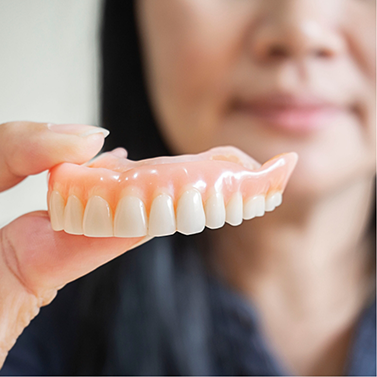
Most dental plans will include some level of coverage for dentures. On average, you can expect your insurance carrier to pay 50% for the restoration, although the exact amount is going to be different depending on what plan you have.
Dental implants are usually not covered by insurance but related procedures such as bone grafts might be. We’re in-network with Delta Premier and an umbrella plan, and we’re always happy to go over your benefits and help you through the claims process to maximize your benefits.
Other Options for Making Dentures Affordable
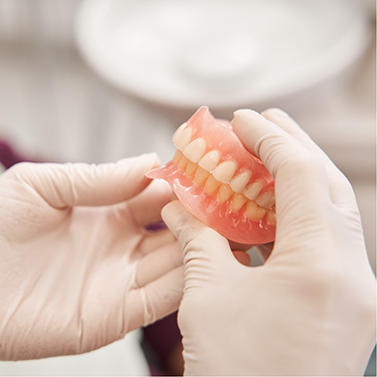
Even without insurance, we can give you options for simplifying the process of paying for dental care. We work with CareCredit, a third-party financier that can make all kinds of dental procedures more budget-friendly by allowing you to pay over several months instead of all at once. CareCredit plans have little if any interest, and there are never any unexpected fees or surprise charges. There are multiple CareCredit plans to choose from depending on your financial situation.
We also work closely with Proceed and Cherry as well as HFV.
Dentures Aftercare
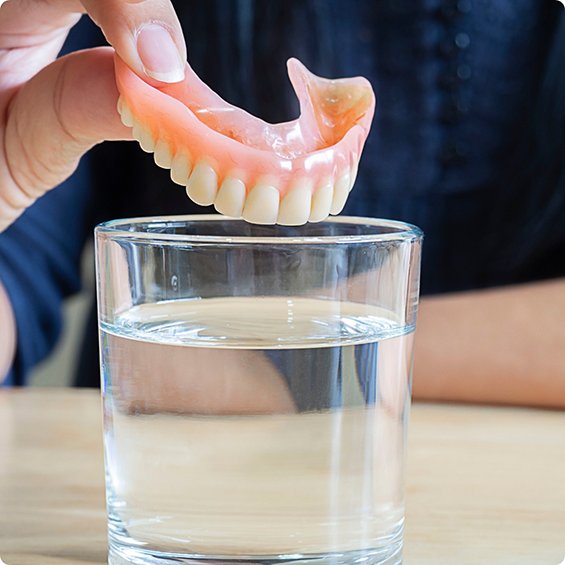
Dentures are a life-changing tooth replacement option. However, even if you have few or no remaining natural teeth, this doesn’t mean that you can refrain from seeing the dentist for regular cleanings and checkups. Your dentist will continue to monitor any existing teeth you have as well as your gum tissue. They will also be on the lookout for any abnormalities that could indicate oral cancer. When you have dentures, it is difficult to pick up on these changes without the help of a dental professional. Early detection from your dentist is key to making a full recovery.
Remove After Eating
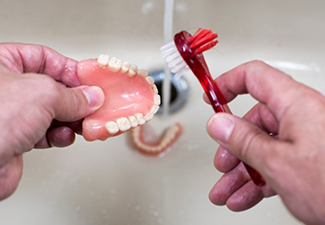
Every time you eat, you should remove and rinse off your dentures. That will help to prevent food debris and plaque from building up. Just remember when you rinse to not use hot water. This can warp the denture and cause it not to fit anymore.
Clean Your Denture
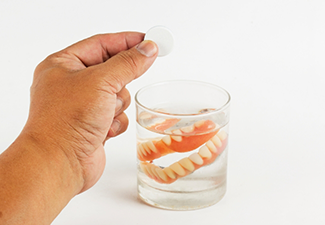
Remove your dentures before you clean them. Using a soft-bristled toothbrush and a small amount of unscented hand soap, mild dish soap, or denture cleaner, gently brush your prosthetics. It’s not a good idea to use regular toothpaste because dentures are unable to stand up to abrasive products. If you aren’t going to wear them again right away, place them in a container of water or denture cleansing solution so they don’t dry out and lose their shape. Always rinse your dentures thoroughly before putting them back in your mouth.
Keep Your Dentures Safe
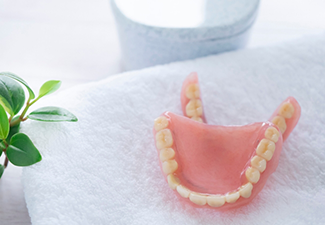
When you clean your dentures, you may want to place a towel underneath you in case they slip out of your hands. This will reduce the probability of them becoming damaged. Also, remember to keep your teeth out of the reach of small children and pets.
Remove When You Sleep
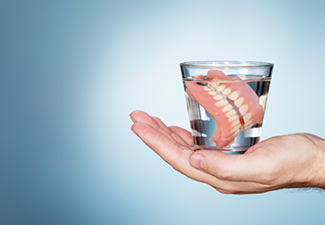
Before going to bed, take your dentures out. Wearing dentures restricts the circulation in your gums and leads to soft tissue irritation. Sleeping with dentures has also been associated with a higher risk of pneumonia and tongue plaque. Overnight, keep your teeth in a denture-soaking solution to prevent them from drying out.
Notice Changes
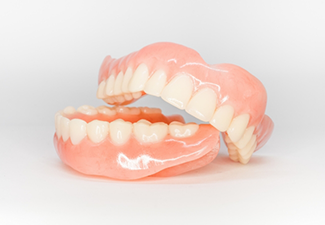
Keep an eye out for changes in your mouth so you can address them with your dentist. This includes mouth sores, gum irritation, and signs of infection. If your dentures become damaged, you shouldn’t attempt to repair them on your own. You could end up accidentally damaging them further. If your dentures are showing any signs of not fitting properly, like shifting or clicking, give us a call.
All-On-4 Dentures
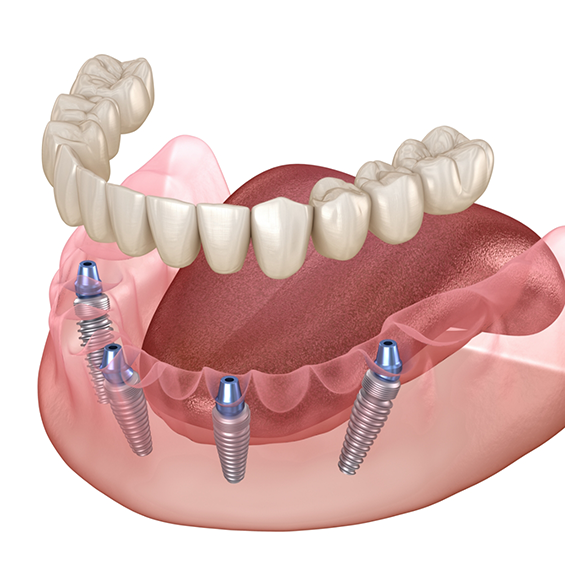
Caring for All-On-4 dentures works a little bit differently. You should brush them twice a day using a soft-bristled toothbrush and nonabrasive toothpaste. Stay away from toothpaste that contains baking soda or stain-removing agents. Floss your replacement teeth every day and consider investing in a water flosser to keep your implants clean. Rinse your mouth with an antibacterial mouthwash every day to prevent the growth of tartar.
Denture FAQs
I Am Interested in Dentures—Where Do I Start?
If you’re ready to start your journey toward a complete smile, your first step is to come see us for a consultation. During this initial appointment, our dentists will have a conversation with you about your tooth replacement goals and address any of your concerns or questions. Then we’ll closely inspect your mouth, gums, and jaw as well as review your medical history.
If dentures are a good choice for you, we’ll explain all your options and our recommendations. If your oral health needs to be improved before you can be considered a good candidate for dentures, we’ll work with you to create a custom treatment plan to get you ready for your brand-new smile.
Do I Clean My Dentures Like Natural Teeth?
Just like natural teeth, plaque and bacteria will build up on your dentures throughout the day. It’s important that these particles are thoroughly cleaned daily to protect your smile from issues like gum disease and oral infections. However, it’s essential that you use the proper products while doing so! Your regular toothbrush and toothpaste are too abrasive to be used on your dentures—they can easily scratch away at their finish and damage them. Instead, be sure to only clean your artificial teeth with ADA-approved denture brushes and cleaners to keep your new pearly whites sparkling, healthy, and strong.
How Long Do Dentures Last?
At Lakewood Complete Dentistry, we craft our dentures out of high-quality materials for beautiful, durable, and long-lasting results. While dentures typically last between 5 and 10 years, you can make the most out of their lifespan by handling them carefully. However, you should always replace your dentures when you notice they no longer fit correctly.
It’s a completely different story, though, if you’ve rebuilt your smile with implant dentures. Dental implants fuse with your jawbone to form a rock-solid foundation. They will never lose their fit or come loose as long as you practice great oral hygiene! You can easily expect your implant dentures to last a lifetime with proper care.
Does Dental Insurance Cover the Cost of Dentures?
Every dental insurance policy is slightly different, so you’ll need to call your insurance provider or read through your policy paperwork to determine what is and isn’t covered. If you like, you can bring your insurance policy paperwork with you to your consultation, and we’ll be happy to review it with you. Our talented and friendly team has years of experience helping patients maximize their benefits to minimize their out-of-pocket expenses.
Generally, dental insurance will cover at least a portion of the cost of your dentures. If it doesn’t, or if you don’t have dental insurance, we also offer financing through Proceed, Cherry, HFV, and CareCredit. These companies offer several different plans that can help break up the cost of your treatment into easy monthly payments. During your consultation, we’ll go over all the ways to make achieving your new smile as affordable as possible!
What is the Average Age for Dentures?
While tooth loss isn’t inevitable, it does happen more often to older folks. As such, the average age of denture wearers is around 45 or so.
Currently, modern research backs this conclusion. The National Center for Health Statistics believes 66% of adults aged 40-64 lack at least one tooth. Similarly, the American Dental Association notes that 57% of those aged 65-74 wear a denture of some sort.
Of course, people of all ages can be good denture candidates. It isn’t just seniors who get the prosthetics. To see if you qualify, just speak with one of our dentists at a consultation.
Is It Hard to Talk with Dentures?
Truthfully, it’s tricky to speak with dentures at first. You’ll need to adjust as you transition from talking with natural teeth. Plus, the length of this process varies depending on each patient. You can trust, though, that you’ll get the hang of it with practice.
Thankfully, there are a few ways to speed up the adjustment. One option is to read aloud to yourself and repeat hard-to-pronounce words. You could also speak slowly – fast speech will sound muffled if you aren’t used to dentures. Since these prosthetics can shift during speech, it’s also a good idea to bite down and swallow before you talk. Denture adhesive can also keep the restorations in place.
Will Dentures Change the Shape of My Face?
Often enough, dentures do change the shape of your face. Luckily, however, this change is usually for the better!
You see, facial muscles start sagging when you lose teeth. Without all your pearly whites, your jawbone lacks the stimulus to maintain itself. This process can then lead to facial collapse – a condition where your face has a sunken look.
All that said, dentures provide support for facial muscles. The result means an improved appearance. Still, remember that this only applies to well-fitted dentures. Ill-fitting ones may not give the right support. Should your dentures not fit well, get them refitted or replaced at once.
Do Upper Dentures Always Cover the Palate?
Honestly, no – upper dentures don’t always cover the palate. Some of them are “palate-less” and leave the roof of your mouth exposed.
Taste issues led to the design of this latter denture. As it turns out, one’s ability to taste food is reduced when the soft palate is covered. To compensate, some dentures for the upper arch are made palate-less. These kinds can have the standard horseshoe shape or be implant-retained.
To learn whether palate-less dentures are an option, talk to our dental team. They’ll show you our offerings and all our upper arch options.

